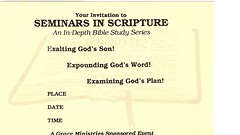My own translation
Gentle reader,
With times as they are I thought I might share how things were perceived way back before we were born and the first book believed to be written of the Old Testament (the Hebrew bible) the book of Job (no, not jobs as one person put it ) but how to deal with the stress that everyone feels at this time. No jobs, (no pun intended -well maybe, no money (or at least not enough to drive to the store (even WalMart is too expensive for many of us) The great 'American Dream' seems to have disappeared! So here is a mini study on the way things are and how God perceives them
Introduction to the Book of Job
THE BOOK OF JOB is one of the most widely quoted stories in the TORAH, the history of the Hebrew people and their God. A version of the TORAH, including the BOOK OF JOB, was later translated and edited into the first five books of the Christian BIBLE, referred to as the THE OLD TESTAMENT. The stories of the TORAH, stemming from a long oral tradition in the ancient world, were probably first written down between the eighth and second centuries B.C.E. ['Before Common Era',
The BOOK OF JOB relates the suffering and resolve of Job, a godly man and possible candidate for 'World’s Earliest Intellectual' since he dares to question his existence. As a spiritual lesson, the story of Job poses a number of questions on the nature of God and the unnecessary pain inflicted on the righteous in what often seems a pointlessly cruel world.
The BOOK OF JOB is also notable for its use of an informed prologue in which the audience is privy to a secret knowledge that the protagonist in the story is not. This use of dramatic irony is most commonly seen in Greek tragedies and adds an element of suspense to the telling of Job’s tribulations.
PLOT:
In the first two chapters, or prologue, of the BOOK OF JOB, God decides to use Job as a demonstration to his skeptical subordinate, Satan, who doubts Job's unflappable faith in God. God tells Satan that he may take away everything from Job. Satan wastes no time and plagues the old man in short thrift; Job soon loses his family, his farm and riches, and is finally covered in hideous boils. Job has no knowledge of God and Satan’s conversations in the prologue nor of the resultant bet on his spiritual faith. Meanwhile, back on the earthly plane, Job’s wife tells Job to turn away from God, while his three friends tell him to repent, assuming that Job has committed an egregious sin to be punished by God so completely. Job keeps his faith but he neither curses God nor openly repents for any mysterious sins.
Instead, he sits quietly and waits for God to explain himself. The answer finally comes in the form of a divine whirlwind. From the heart of the raging storm, God speaks to the frightened Job, telling him that God's reasons are incomprehensible to the human mind. Job’s health, family and riches are restored at the end of the book -- a reward for his faithfulness.
That in a nutshell is the whole book but we are (being more literate that those who want to watch the boob tube ad nauseum) will take a wee closer look at several factors and try to draw some understanding as well as comfort for the 21st century.
Until next timed then I am as hopeful as one can be waiting on God. Of course if you have no hope then. . . what? Love,
Denis





No comments:
Post a Comment